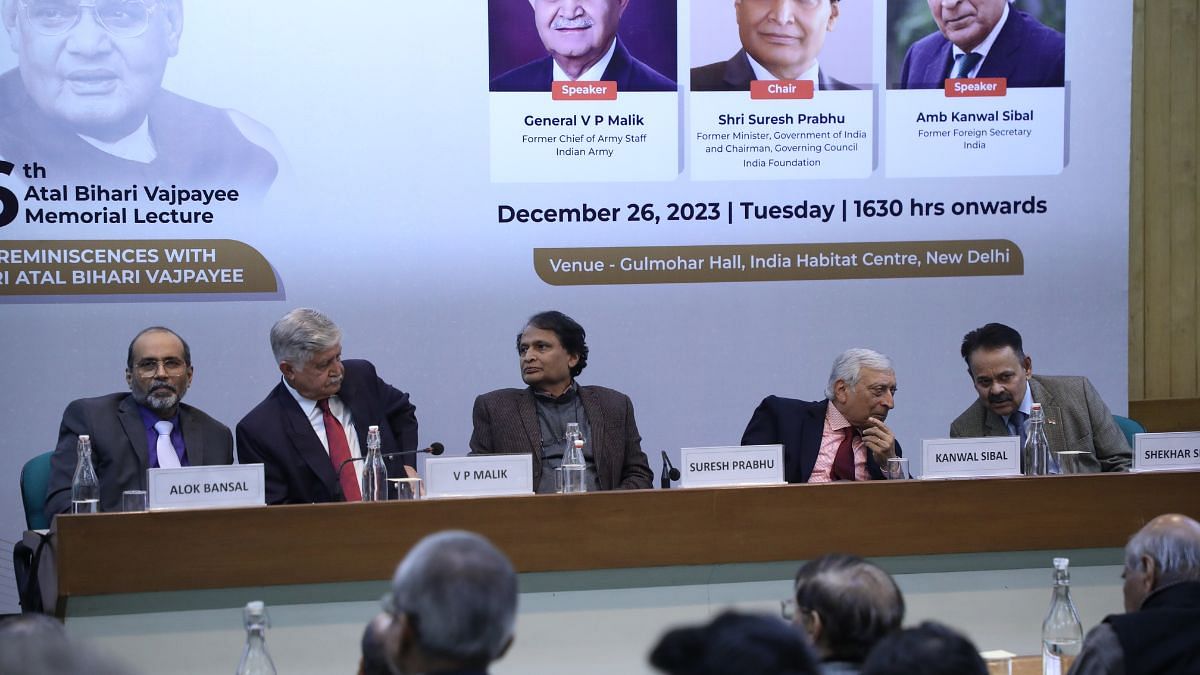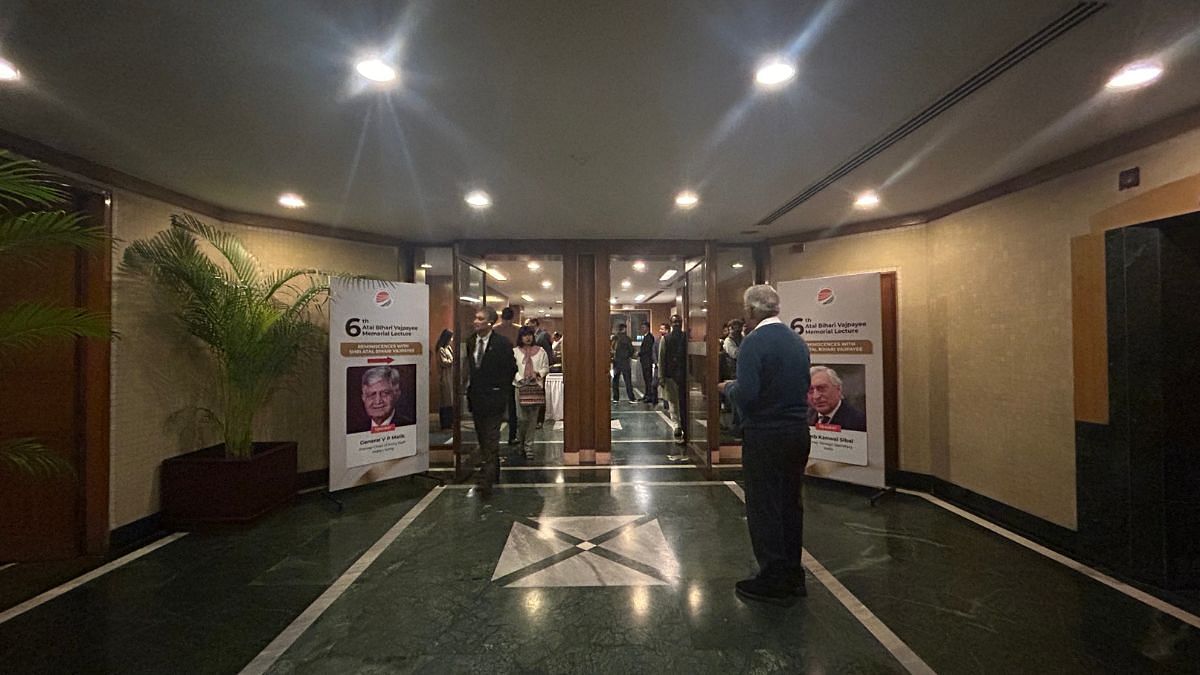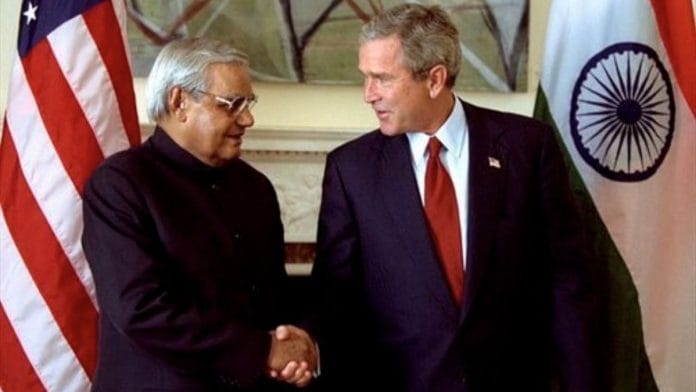New Delhi: During his 1998 visit to India, French President Jacques René Chirac pitched the sale of Airbus planes to Atal Bihari Vajpayee. The prime minister replied calmly, saying that he wouldn’t want to miss the bus, leaving Chirac hopeful. US President George Bush would address the Indian PM as “sir”—a testament to the kind of wit he possessed and the respect he enjoyed in the company of global leaders. These and many other lesser-known stories captivated a crowd of around 200 people on a chilly winter evening at New Delhi’s India Habitat Centre.
Vajpayee and Bush had a unique dynamic, with the latter holding the Indian leader in deep respect, adopting a demeanour reminiscent of a deferential young boy, according to former foreign secretary Kanwal Sibal, who worked closely with Vajpayee.
Despite this apparent advantage, Vajpayee’s gentle nature and aversion to small talk kept Bush from fully leveraging their rapport, as Sibal observed. “Bush knew his background. He kept calling him ‘sir’, behaving like a little boy,” Sibal said.
At the 6th Atal Bihari Vajpayee Memorial Lecture held at the IHC on 26 December, Sibal, alongside other distinguished former government officials, discussed Vajpayee’s interactions with global leaders. He portrayed Vajpayee as a statesman who chose his words judiciously, often “leaving doors open for interpretation.”

The Atal Bihari Vajpayee Memorial Lecture series, established in 2018 by the India Foundation—a research centre dedicated to the challenges and opportunities facing the Indian polity—pays tribute to the former prime minister. The inaugural lecture was delivered by the late former Union finance minister, Arun Jaitley. Since then, External Affairs Minister S. Jaishankar and former President Ram Nath Kovind have graced the podium.
This year, in recognition of Vajpayee’s contributions to India’s political, economic, and diplomatic landscape, both Sibal and VP Malik, former Chief of Army Staff, shared insights about him. The lecture not only celebrated Vajpayee’s life but also explored the nuanced aspects of his legacy, which continue to influence India’s foreign policy and defence strategies today.
Also read: Atal Bihari Vajpayee has just been gift-wrapped, returned to the RSS in a new book
A man of measured words
Atal Bihari Vajpayee’s decision to conduct nuclear tests, despite the inevitable international backlash and economic sanctions, remains one of his boldest moves as India’s prime minister, according to Sibal.
“To my mind, the biggest contribution that he made to national security was going for the nuclear test. It was a bold decision with a lot of concerns,” Sibal said.
During the lecture attended by former government officials, army chiefs, and academics, both Sibal and Malik shed light on Vajpayee’s adept handling of complex diplomatic situations. They cited instances such as the Iraq invasion and border negotiations with China, where Vajpayee employed his strategic acumen and wit, ensuring discussions remained open-ended and didn’t give away anything that could be used against the country.
Vajpayee’s diplomatic strategies were not only evident in his handling of the Iraq situation but also during the IC 814 hijacking crisis, where his decisions reflected a deep understanding of international relations and national security.
Sibal dwelled on the big Iraq diplomatic challenge that Vajpayee continued to face but dealt with it like a strong leader. Against the backdrop of mounting US pressure, Vajpayee’s refusal to commit troops without a clear UN resolution exemplified his adherence to strategic principles, Sibal remarked.
“It was the wisdom of Mr Vajpayee because behind the scenes, he was the man who was controlling everything. Brajesh Mishra would go to his home every morning and evening and get his instructions. So, the credit for all this should go to PM Vajpayee,” he said, describing Vajpayee as a man of conscience and a “gracious, kind, and thoughtful” individual.

Throughout the lecture, the halls brimmed with attendees eager to know more about Vajpayee from those who had worked closely with him. “I am here to understand what it would have been like for these people to be in such close proximity with Vajpayee ji,” Sultan Shaheen, a guest, told ThePrint.
Also read: When Vajpayee cleverly blamed Tilak for dividing Hindus and Muslims in 1916
A firm leader, a peace-loving poet
Throughout his tenure, Vajpayee consistently pursued peaceful resolutions, maintaining unwavering commitment to creating diplomatic channels with Pakistan, even during the tumultuous times of the Kargil war and ensuing tensions.
Malik, who served as the Chief of Army Staff during Vajpayee’s second term, provided insights from the military perspective. He emphasised Vajpayee’s leadership during pivotal moments such as the nuclear tests, the Kargil conflict, and the hijacking of IC814. Malik lauded Vajpayee’s approach in keeping the military away from domestic politics, fostering a professional and apolitical armed force.
Highlighting Vajpayee’s decisive nature, Malik mentioned two issues on which the PM had firmly made up his mind and did not consult anyone: nuclear matters and pursuing peace with Pakistan. Vajpayee’s nuanced approach, balancing military operations in Kashmir with an emphasis on “jamhooriyat” (democracy) and “kashmiriyat” (Kashmiri identity), demonstrated his commitment to finding a peaceful resolution in the region. “He would consult all the colleagues readily before making a final decision but once he did, he would be very firm,” Malik observed. “He was bent upon winning the hearts and minds of people.”
Malik further conveyed Vajpayee’s deep regard for the Indian Army. He recounted instances, such as during the Kargil war, when Vajpayee expressed concern over the inadequate compensation provided to the families of soldiers killed in war. Upon learning the required amount, Vajpayee promptly approved the necessary funds. “That was Vajpayee for you,” he said.
Describing him as a peace-loving poet, Malik said that Vajpayee’s poetry revealed a man deeply empathetic yet unwavering in his convictions. Concluding the lecture, Malik recited lines from one of Vajpayee’s poems.
“My poetry is a declaration of war, not an exordium to defeat. It is not the defeated soldier’s drumbeat of despair, but the fighting warrior’s will to win.”
(Edited by Prashant)






